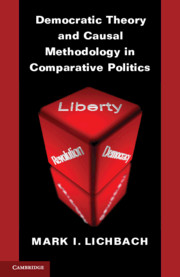Part III - Conclusions: Three Chapters, Five Themes, and Twelve Theses
Published online by Cambridge University Press: 05 May 2013
Summary
CONCLUSIONS: THREE CHAPTERS, FIVE THEMES, AND TWELVE THESES
Daron Acemoglu and James A. Robinson, Lisa Wedeen, Atul Kohli, and Charles Tilly write from within Barrington Moore’s Problem situation: in the competitive international environment facing developing countries, which alternative modernities challenge democratic liberalism? How do social forces contend, democratic states arise, and policy regimes matter? And what are the origins, operations, and outcomes of state institutions? In addressing these questions, these comparativists confront the Barrington Moore Problem: the elective affinities of normative ideas about democracy and empirical conceptions of causality. An author’s normative democratic theory bears a strong relationship to his or her empirical causal methodology.
Moving forward, offering solutions and not only characterizing problems, Part III’s three chapters advance five constructive themes elaborated into twelve theses. While the texts examined here have strengths and weaknesses that can serve as complements and substitutes, Chapter 7 urges comparativists to begin with Tilly’s contentious-politics approach. The best way to advance democratization studies is to use Tilly as the springboard and the others as sounding boards to study the causal agency of individuals (Thesis 1), groups (Thesis 2), and democracies (Thesis 3).
- Type
- Chapter
- Information
- Democratic Theory and Causal Methodology in Comparative Politics , pp. 123 - 124Publisher: Cambridge University PressPrint publication year: 2013



